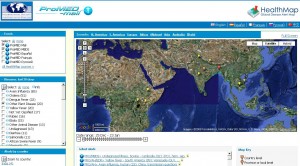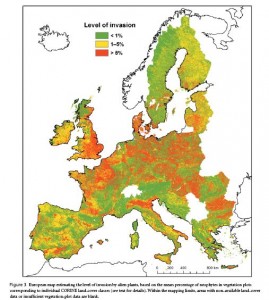I’ve been sick at home for the past few days with what the wife is pleased to refer to as a man-cold but I think is a middling form of bubonic plague: bad enough to keep me from getting out of bed, not bad enough to prevent me surfing the tubes. Anyway, it’s amazing what you can learn when you have the time to follow links to your heart’s content. I won’t go into the details of how I got there, although it was actually rather fun, but anyway, for example, this evening I landed totally serendipitously, after quite a meander from something totally unrelated, on a website of genuine agrobiodiversity interest. It’s about Porphyra. This is a genus of red algae which is very important as food in Japan, where it is know as nori. The Japanese are big eaters of different sorts of seaweed. But Porphyra is the most widely consumed seaweed in the world, and is even farmed. I just had no idea that the stuff you wrap around sushi comes from one (ok, maybe two) particular species, and one so complicated to grow to boot. I wonder if it will all now go for biofuel.
Tule boat ahoy
You may remember a post I did last summer on sedges called tules. Although not domesticated, tules have (or had) a lot of interesting uses among the Native Americans of California, including in the construction of boats. People still build tule boats, mainly for fun. I bring all this up because of a recent article on some fascinating new thinking about how people spread around the world. It seems that there is increasing evidence that they may have done so by boat, including perhaps during the initial peopling of the Americas from Asia. In which case they could well have gone from kelp bed to kelp bed in tule boats. Incidentally, the oldest boat in the world is a pine dugout made by the Bog People of NW Europe in about 8500 BC.
Army worms on the march
I think I may have blogged before about the ProMED-mail “global electronic reporting system for outbreaks of emerging infectious diseases & toxins.” You can get email alerts and also produce maps for plant diseases, such as this one:

Unfortunately, the system only covers infectious diseases. It is a programme of the International Society for Infectious Diseases, after all. Otherwise, it would have picked up the plague of armyworms currently affecting Liberia. A quick search of my feed reader revealed outbreaks in Namibia and Zimbabwe within the past two years. And Google Trends shows some interesting, ahem, trends in searching News archives show this timeline for news of this pest 1 over the past few years:

There’s research on natural enemies going on, but that’s not going to help Liberia right now.
Vienna stressfest
I know it’s a long shot, but are any of our readers going to the conference on Plant Abiotic Stress Tolerance next month in Vienna? It seems to be mainly about Arabidopsis, but the final session on breeding might just hold some agrobiodiversity interest, and if so we’d love to know about it.
Europe invaded by aliens
The journal Diversity and Distribution has a paper on the distribution of alien plants in Europe. You need a subscription for that, but the paper also appears to be online here, on the website of one of the authors. Here’s the map (click to enlarge it):

Could this be used to estimate the level of threat faced by some crop wild relatives?